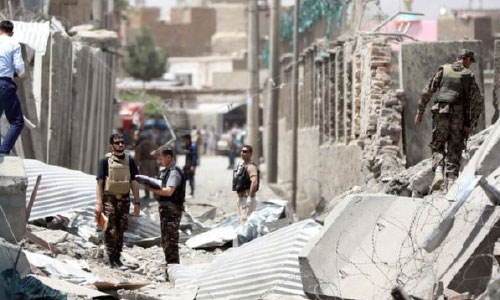The Taliban leadership continues its talks with the US representatives and its war against Afghan state and nation. It has adopted an equivocal policy which triggers mixed feelings. The Taliban’s war-war and talk-talk approach narrows down the possibility for peace. If the current round of peace talks, ongoing in Qatari capital of Doha, does not mitigate violence in Afghanistan, people will lose their hope and trust in the process.
Civilian death toll has increased in the wake of the Taliban’s deadly attacks, including Wednesday’s heavy suicide attack in Kabul which killed and wounded dozens of non-combatants – for which the Taliban claimed responsibility.
The Taliban, as have threatened earlier, seek to mar electoral campaigns and send threatening message to Afghans not to participate in the presidential elections, slated for late September. They are unlikely to be able to reconcile their fundamental ideology with democratic principles.
The Taliban have to adopt an unequivocal policy. If they are sincere in the peace talks, they have to show their sincerity through reducing violence, mainly against civilians. The ambiguity in their policy is highly frustrating.
In the wake of the ongoing peace talks between the Taliban and US negotiators and the Taliban’s words for reducing violence against civilians, Afghans felt a gleam of hope for peace and remain optimistic to some extent. But their daily attacks and suicide bombings against civilians leave people with despair and distrust.
On the one hand, the Taliban claim that their ideology had been moderated, but on the other hand, they carry out large-scale attacks to bar Afghans from participating in the elections. The Taliban have to clarify it if the view of their political leaders are in contrast with those of their military commanders. And they have to assure that they will disarm all their militants in case of reaching peace agreement with their negotiators.
It is self-evident that the Taliban have paid respect neither to the rights and dignity of Afghan people nor to their demands. For instance, in Loya Jirga (Grand Council) held in late April, Afghan representatives urged the Taliban to reduce violence and negotiate with the Kabul government. Moreover, President Muhammad Ashraf Ghani also called on the Taliban to listen to the voice of the public and stop violence. But the Taliban turned a deaf year and continued their militancy.
It is also believed that the Taliban have recruited a number of thugs and mercenary fighters, rather than ideologues, to fight against the Afghan government. The Taliban leadership is unlikely to lose anything when their fighters are killed since there are many other mercenary fighters and thugs. The Taliban leaders reside in luxury and heavily-guarded apartments in foreign states, along with their families. They feel neither the pain and sufferings of Afghan civilians nor that of their rank and file.
I believe that the Taliban are not undefeatable. The “war on terror” should not be compared to that of Soviet Union. In the war against the Taliban, both Afghan government and people support foreign forces and the Taliban are known as a militant group not “Mujahidin”.
The Taliban group is not stronger than Liberation Tigers of Tamil Eelam (LTTE), a guerrilla force fighting against the Sri Lankan government and designed as terrorist by 32 states. The LTTE was using women and children in combat and carried out a number of high-profile assassinations.
The LTTE was involved in four unsuccessful rounds of peace talks with Sri Lankan government and it was in control of 76 percent of the landmass in the Northern and Eastern provinces of Sri Lanka. But the Sri Lankan government intensified its attacks and defeated the group.
With this in mind, if the Taliban continue their militancy and refuse to strike a deal with the Afghan government, the US-led NATO states should resume their military operations and increase the number of their troops in Afghanistan so as to defeat it similar to LTTE in Sri Lanka and IS group in Iraq. In other words, the Afghan government has left no stone unturned to bring the Taliban to the negotiating table, but if the Taliban still continue their militancy, all regional states have to support Afghanistan in dismantling the Taliban group. The regional countries should also share intelligence to defeat this group. If any countries are found or suspected to support the Taliban in one way or another, they must be pressured and sanctioned by all regional and global stakeholders.
In short, the Taliban either have to reduce violence and reach an agreement or face the consequences.
Home » Opinion » Targeting Civilians – A Lukewarm Response to Peace
Targeting Civilians – A Lukewarm Response to Peace
| Hujjatullah Zia

